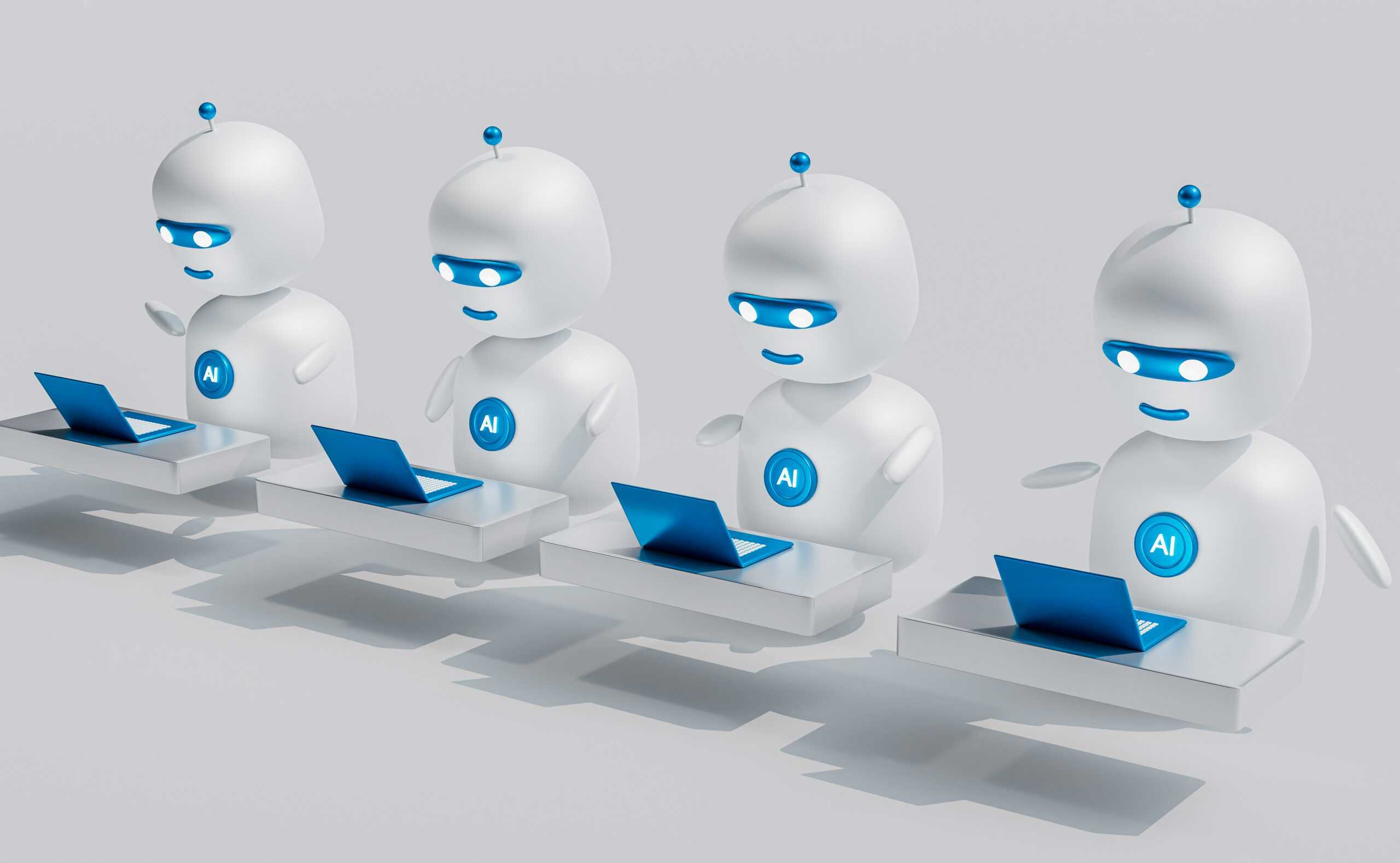A look at the digital upheaval in the world of work through artificial intelligence. Current studies show that digitalization will bring about a significant change in the world of work. However, this change does not have to be all negative, but can represent an opportunity - especially for social professions.
Artikel von Sarah Krois, ngojobs.eu
Lesezeit: ca. 10 Minuten
Table of contents:
- 1st Deloitte survey and AI Quick Study: Digitalization in everyday working life
- 2. a look into the future of personnel consulting
- 3. an opportunity for social professions
1st Deloitte survey and AI Quick Study: Digitalization in everyday working life
The digital transformation is having a lasting impact on the world of work. A recent study by Deloitte shows that many employees in Austria are already noticing noticeable changes in their work processes. While the majority welcome the advancing digitalization and see it as an opportunity to increase efficiency, there are also fears, particularly with regard to possible job losses.
More technology, more uncertainty
A survey conducted by Deloitte in August 2023 shows that 61% of respondents are in favor of a balanced mix of human interaction and technological support. At the same time, however, 38% of respondents expressed fears of job losses due to digitalization. There is therefore still a need for information about the potential of digitalization to create new jobs.
The digital revolution is already in full swing in domestic companies. 87% of employees are noticing increased investment in new technologies and infrastructure. An impressive 81% see a restructuring of work processes. A quarter of respondents already report automated activities and the use of digital tools.
The introduction of artificial intelligence (AI) into the world of work is underway. 16% of employees state that AI is used at least occasionally in the company. The technology is primarily used for repetitive tasks and automation (49%) and for data-based decisions (34%). More than a third of respondents see the use of AI as a great opportunity, while another third see the technology as a threat.
The future of skills
With the increased use of digital tools, the skills required of employees are also changing. 75% see technical skills such as programming and data analysis as indispensable. However, critical thinking, problem-solving skills (65%) and communication and collaboration experience (58%) are also increasingly important.
Use of AI in Austria
The Deloitte AI Quick Study from September shows that among 168 managers, only a small proportion of companies make intensive use of this technology. Nevertheless, the use of AI technologies is viewed positively by over 93% of companies.
In an interview conducted by personal manager with two leading experts, Anna Nowshad and Evrim Bakir, it was revealed that artificial intelligence has a wide range of applications in companies. AI has a particularly strong influence in process automation and the analysis of large amounts of data. In terms of human resources, there are also numerous opportunities: from speeding up recruiting processes to talent management and adapting skills to new working models.
Changes in the organizational structures
One key point from the interview is the importance of AI with regard to the future of work. The technology is not only changing everyday working life, but also requires a rethink of organizational structures. It takes over repetitive tasks and enables tasks to be better adapted to individual skills, regardless of rigid job profiles.
The interview also shed light on the challenges that companies, and HR management in particular, have to overcome in relation to AI. There are fears of job losses and changes in the working environment. However, it is emphasized that AI is rather supportive and creates space for more creative activities. It is essential to actively involve employees in the transformation process and train them for the new requirements.
In conclusion, it was emphasized that the integration of AI in companies is an interdisciplinary project. HR, IT and other departments must work together to define the desired goals and develop a clear vision for the use of AI.
2. a look into the future of personnel consulting
A recent interview by DER STANDARD with Martin Mayer, Managing Director of Iventa, one of the largest recruitment consultancies in the DACH region, provides insights into the world of recruitment. Mayer expressed his astonishment that many media outlets are still reporting an enormous labor shortage, while in his business area he clearly senses that many companies are putting the brakes on new hires. The once dynamic, almost desperate search for qualified personnel seems to have subsided for the time being.
The impact of artificial intelligence on the labor market
Martin Mayer emphasizes that the advancement of artificial intelligence will bring enormous growth pressure for his company. He also sees a huge step towards automation and imminent consolidation in the highly fragmented recruitment consultancy sector. This is because not all smaller boutiques or networks are able or willing to make the necessary investments in AI.
Mayer predicts a massive change in the skills in demand over the next three to five years. Repetitive office tasks in particular could be performed with far fewer staff thanks to automation. This affects assistants, media people and content creators. Top knowledge workers, on the other hand, will be less affected. Overall, three to five percent of all jobs could be at risk in the near future.
A new era for personnel consulting
The rapid pace of automation and the increased use of AI is also casting a spotlight on the future of recruitment. Algorithms are already gatekeepers for applications, but now bots are making their entrance. Initial contact and active sourcing could be taken over by bots in the future. However, Martin Mayer emphasizes that people will continue to play a decisive role in the future.
Despite these rapid developments, Mayer does not expect a linear development. As in other sectors, there will also be counter-movements in personnel consulting. There will be room for niches and specialized service providers.
Digitization and automation
The changes in the job market are forcing many in the recruitment industry to make a decision: do they go digital and get bigger to move larger volumes, or do they look for a niche or cooperation with others?
The interview with Martin Mayer provides an exciting insight into the future of HR consulting and shows how the industry is preparing for the challenges of advancing digitalization and automation. It becomes clear that flexibility, innovation and investment in technology will be decisive factors for success in this changing world of work.
3. an opportunity for social professions
The ongoing development of AI raises many questions about the future of the world of work. However, according to Viktor Mayer-Schönberger, data law expert and Professor of Internet Governance at the University of Oxford, fears of job losses are only partially justified. In an interview with ORF.at, he explains why a reorientation of the world of work is crucial and how social professions and skilled trades in particular could become more important.
The power of AI in the professional world
The latest advances in the field of artificial intelligence are impressive. AI can write complete presentations, formulate creative advertising copy and create complex project concepts in a matter of seconds. At the same time, more and more people are wondering whether their work might be taken over by digital automation.
A report published by investment firm Goldman Sachs in March estimates that AI could take over a quarter of all jobs currently performed by humans in the future. In the European Union and the USA, up to 300 million jobs could be lost due to automation.
The revolution of decisions
Mayer-Schönberger does not share the concern about the threat of mass unemployment. He compares the current situation with the industrial revolution 150 years ago. Back then, there were more professions in the end, but the content of these professions was completely different. Manual work was replaced by organizational and decision-making activities. He sees it similarly now with AI: decision-making work can be partially replaced by technology.
The change in classic desk jobs
Traditional office jobs in middle management, administration and other administrative areas are particularly affected by this change. Jobs that were previously considered comparatively secure could now be taken over by AI. This affects areas such as accounting, data processing and finance. Society is facing major challenges, emphasizes Mayer-Schönberger. Instead, employees could be relieved of tedious tasks in order to have more time for activities where human skills are indispensable.
Opportunities for social professions
A team of Swiss researchers has developed an automation risk index (ARI) to investigate which occupational fields could be influenced by automation in the future. The researchers examined 976 professions and assessed them using their index. The ORF.at chart clearly shows that the job groups in education (1) and community and social services (2) in particular, as well as physical and social services (5), are only exposed to a low level of influence from AI.
This means that social professions in particular, such as nursing, education and mental health, could be upgraded and made more attractive and thus receive a boost.
Mayer-Schönberger emphasizes that while AI can provide support in care, it will never replace a human carer. There will be a growing need for nursing staff, which can be met with the help of technology. According to the Austrian Ministry of Health, up to 6,700 additional nurses will be needed in the care sector alone by 2030 due to demographic trends.
Mayer-Schönberger is also certain: "All human services will continue to exist. Even those professions in which creativity plays an important role cannot simply be replaced by AI, such as in the skilled trades, where new and individual ideas are in demand. But if these are the future focal points of human work, it will require a change in our society, because then we will have to adapt our education system and our thought patterns accordingly."
The future of work lies in change
The crucial question is therefore not: Will there be fewer or more jobs as a result of AI? Rather, the question is: How will jobs change in the future? It will be about supporting people in developing and shaping these changes. The key skills of the future are social and creative skills, not just intelligence or memory. The changes are inevitable, but they will also create new opportunities and requirements for employees. It is time to adapt to these new requirements and change the education and work system accordingly.
Was sagst du zu dem Thema? Gerne kannst du uns dein Feedback an support@ngojobs.eu schreiben.
Sources:
- https://www2.deloitte.com/content/dam/Deloitte/at/Documents/presse/at-deloitte-studie-digitalisierung-arbeitswelt-2023.pdf
- https://www2.deloitte.com/at/de/seiten/press-release/deloitte-ai-quick-study-2023.html
- https://mein-bereich.personal-manager.at/kuenstliche-intelligenz-kann-die-qualitaet-der-personalarbeit-heben
- https://orf.at/stories/3315684/
- https://www.derstandard.at/story/3000000188313/bis-zu-f252nf-prozent-der-jobs-gef228hrdet
- Automation Risk Index (ARI): https://lis2.epfl.ch/resiliencetorobots/#/
Image rights:
- Unsplash: https://unsplash.com/de/fotos/ein-laptop-auf-einem-holztisch-kdNhf7vJSik
- Pixabay: https://pixabay.com/de/photos/technologie-frau-tablet-team-4111080/
- ORF: Source: Science Robotics/Dario Floreano and Rafael Lalive, EPFL
- pexels.com: https://www.pexels.com/de-de/foto/freudige-erwachsene-tochter-die-gluckliche-uberraschte-altere-mutter-im-garten-begrusst-3768131




